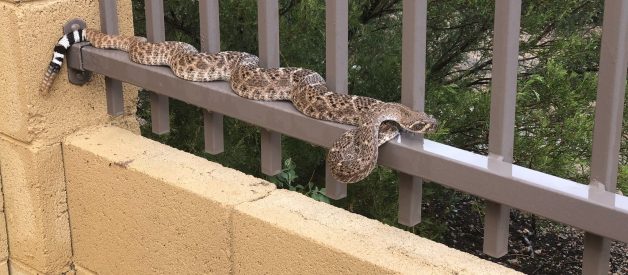My experience as a rattlesnake researcher, traveling the continent for the last 20 years and finding many thousands of wild rattlesnakes, has ultimately lead to a great understanding of how these animals live and move in areas around homes. The rattlesnake relocation group that I manage is called to homes to capture rattlesnakes in the most rattlesnake-heavy urban areas in the country: the Phoenix and Tucson metro-areas. Aside from the thousands of rattlesnakes I have personally captured at homes, my team has captured just as many, as the busiest and most-experienced rattlesnake removal team in the country. We have a tremendous amount of experience with why rattlesnakes end up in yards, how to prevent them, and see all of the mistakes ? and ultimately the results of them. If I were to buy rattlesnake fencing to install in my own yard to protect my own family and pets, what would I look for?
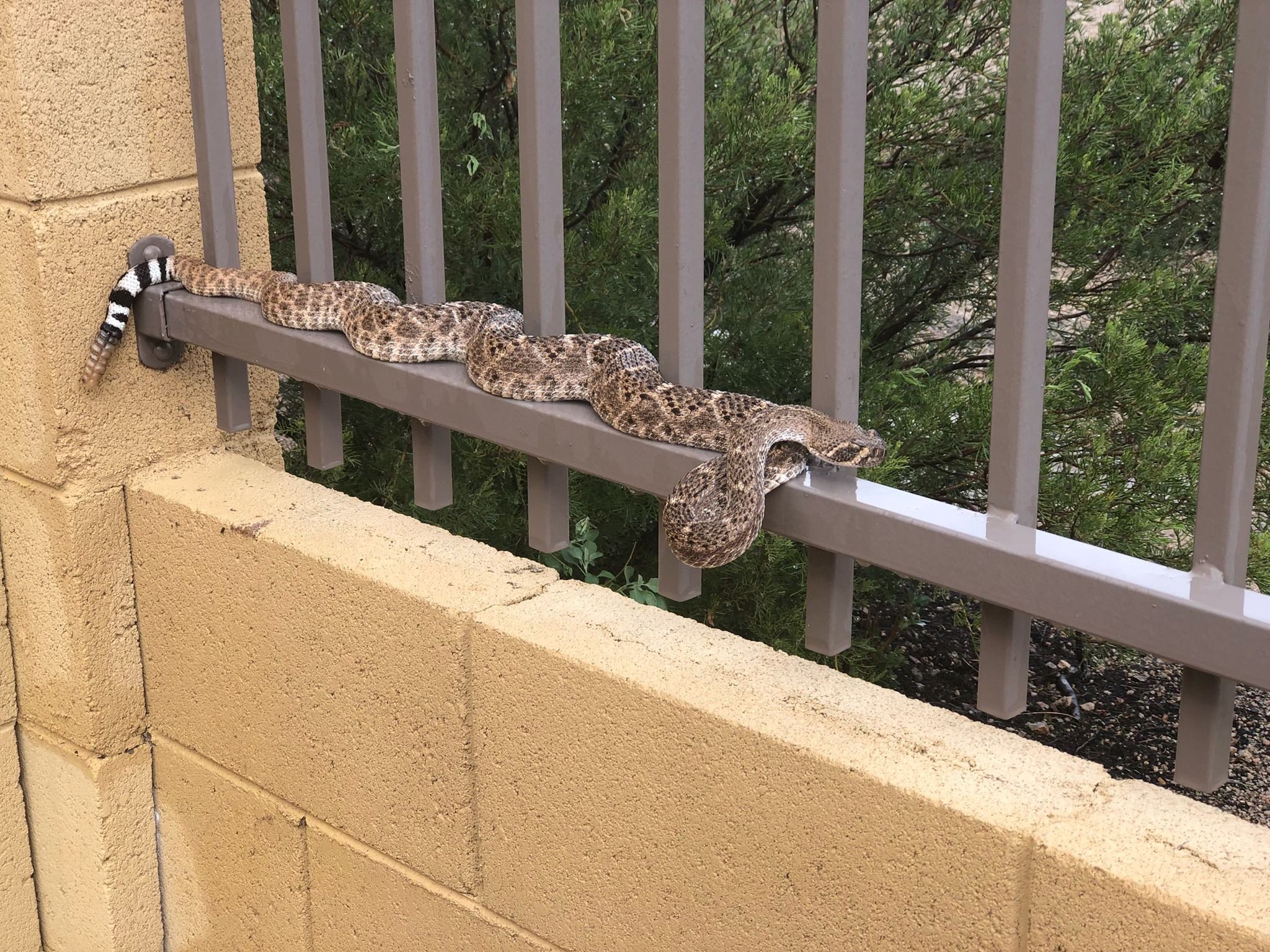 Rattlesnake climbing through viewfence without snake fencing, as photographed by a rattlesnake relocator in Phoenix.
Rattlesnake climbing through viewfence without snake fencing, as photographed by a rattlesnake relocator in Phoenix.
Based on a tremendous amount of experience, data, advice from successful homeowners, discussion with other rattlesnake experts, herpetologists, contractors, realtors, and more: this list should be considered your definitive buying guide for rattlesnake prevention and snake fence services. Does the estimate you have in your hand pass the smell test? If it doesn?t, keep looking.
The basics: what is a snake fence?
A snake fence?otherwise called rattlesnake fence, rattlesnake exclusion, snake proofing, snake barrier, and a dozen other names, is simply a method of keeping rattlesnakes out of an enclosed area.
At its most basic form, snake fencing is a series of materials attached to existing structures, like fences, gates, drains, etc that prevent snakes from getting into an area. This may look different and have varying factors in different parts of the country, but most homeowners seeking rattlesnake fence options live in these Southwestern states: Arizona, California, and Nevada.
The term ?snake fence? could be a bit misleading, since none of these will absolutely keep out all species of snake. The fencing is specifically focused on rattlesnakes, as the only species that?s really going to do any harm to kids or pets. Think of snake fencing as a safety precaution that?s meant to protect from dangerous snakes, not just ones the homeowner may find scary or gross.
While snake fencing certainly provides a pretty good deterrent effect to non-venomous snakes, like gophersnakes and kingsnakes, their athletic abilities differ from rattlesnakes so they may be able to get in from time to time.
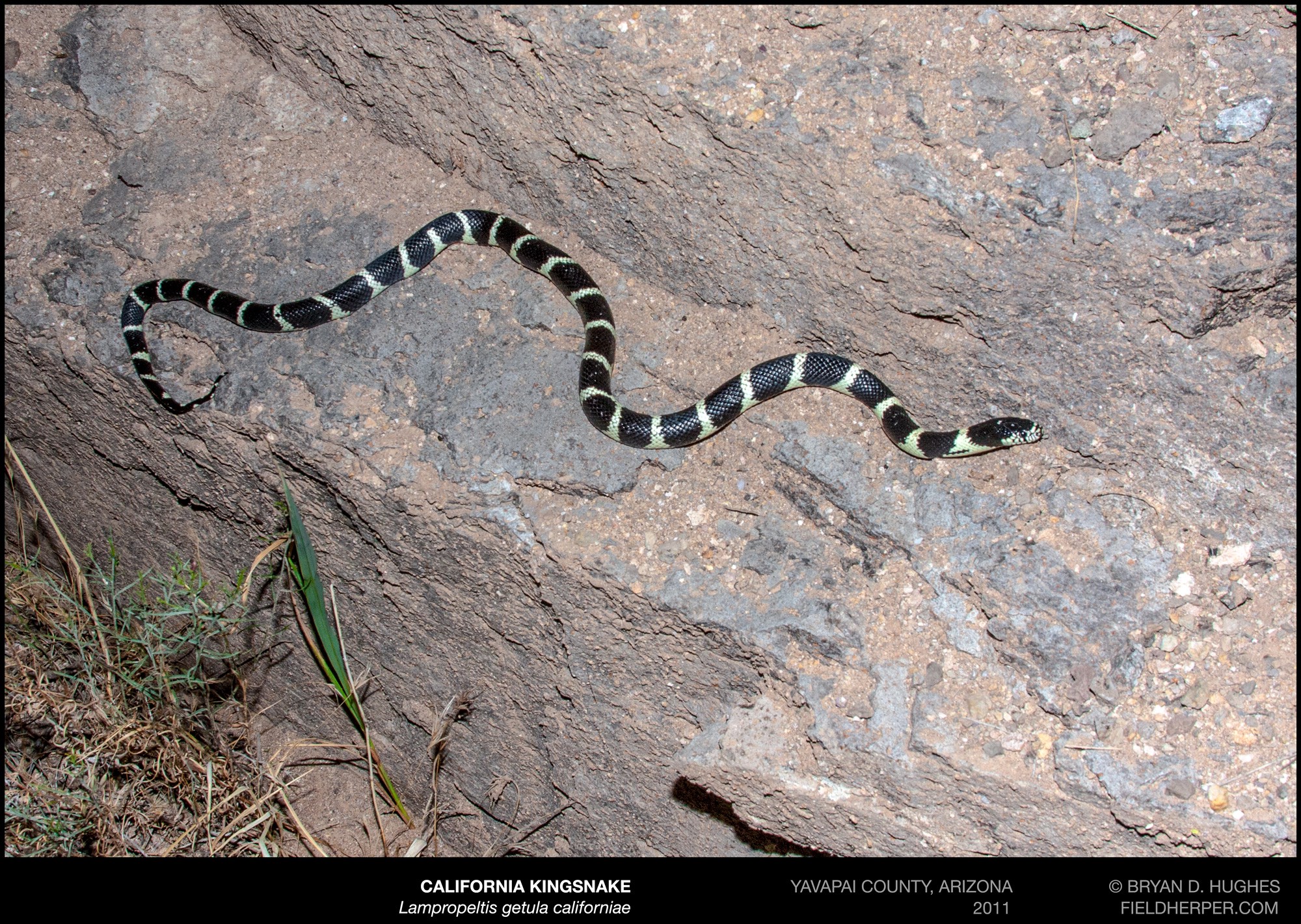 Kingsnakes are commonly found in yards and can sometimes climb over snake fencing, but are nothing at all to worry about. Any claims to keep out all harmless species of snake should be a red flag.
Kingsnakes are commonly found in yards and can sometimes climb over snake fencing, but are nothing at all to worry about. Any claims to keep out all harmless species of snake should be a red flag.
Don?t worry, however, as a harmless snake in the yard is not necessarily an indication of a problem with snake fencing or the practice as a whole. For the rest of this article I will speak specifically about deterring rattlesnakes, regardless of the term used. Reputable snake fence companies are up-front with that fact. In fact, if any snake fencing company makes the claim that their service will 100% keep out all species of snake?consider that a red flag from the start.
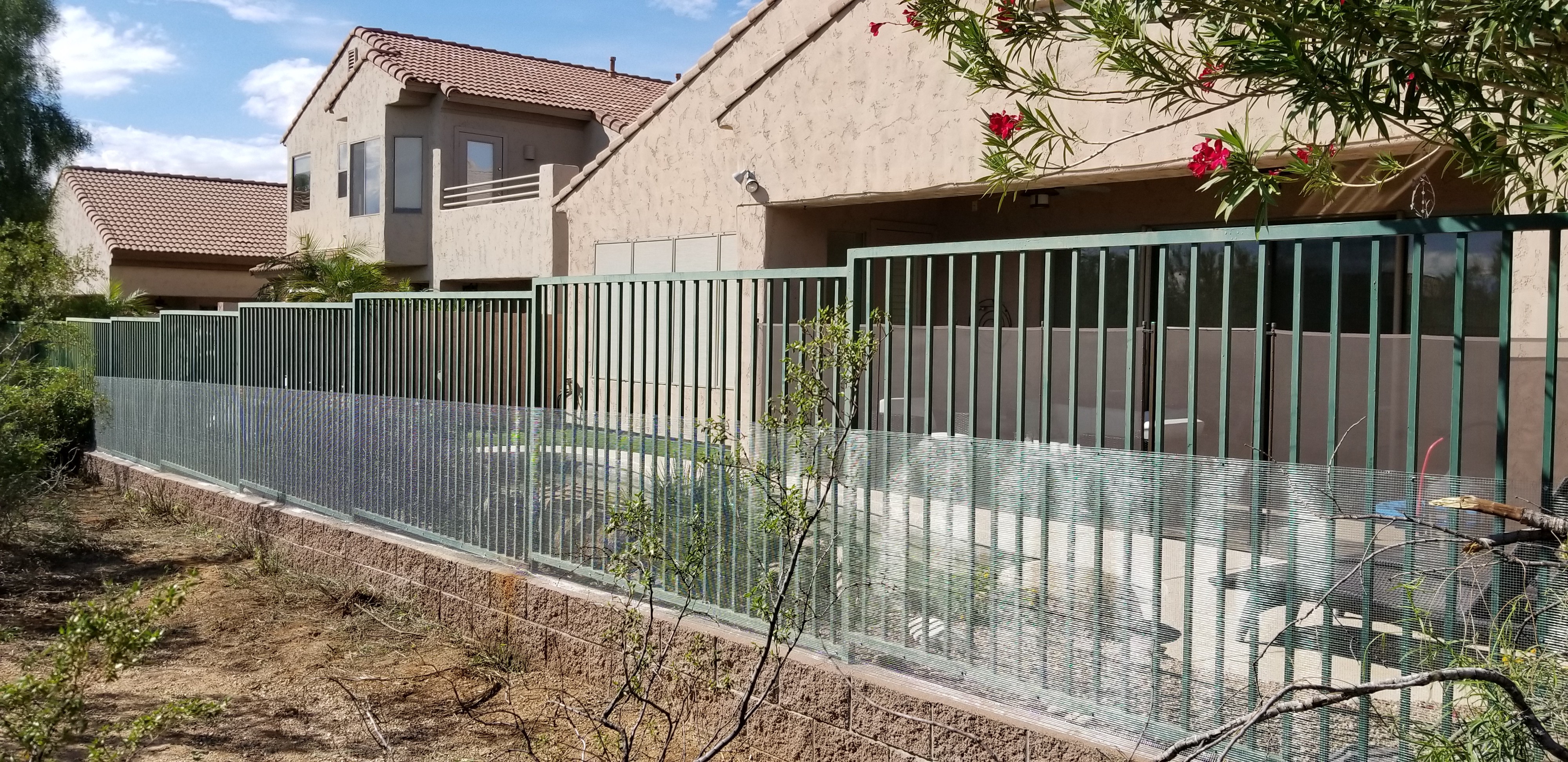 The typical Phoenix-area home with properly-installed rattlesnake fencing.
The typical Phoenix-area home with properly-installed rattlesnake fencing.
Who needs a rattlesnake fence?
If you?re located in the middle of the city ? not to worry, you will probably have no need for rattlesnake fencing. There is sometimes a perception, especially to new residents of the desert southwest, that rattlesnakes are just hanging out under every rock ready to attack, but fortunately that is far from the truth.
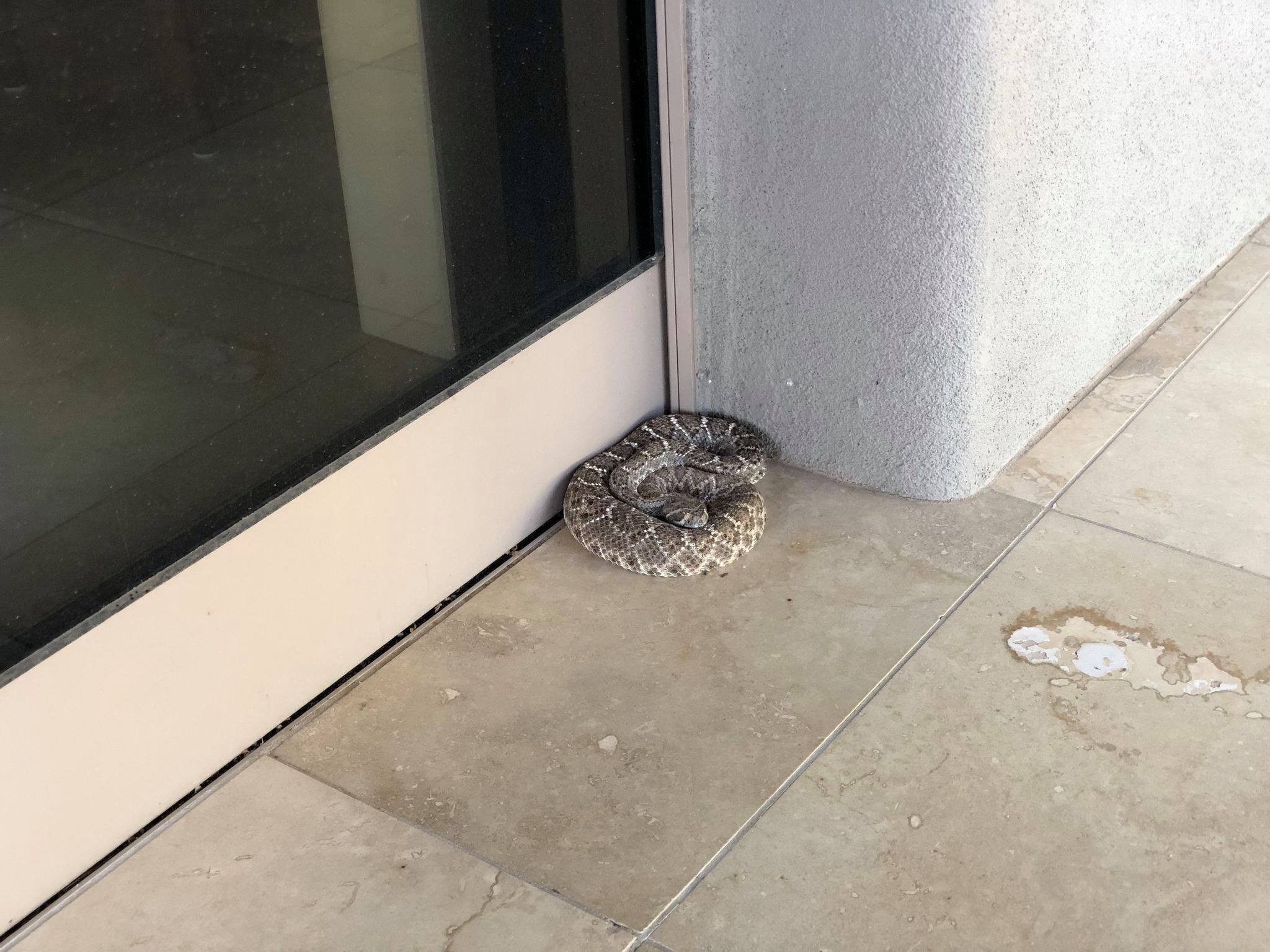 Rattlesnake sitting on the back patio of a Phoenix home.
Rattlesnake sitting on the back patio of a Phoenix home.
Who needs a rattlesnake fence? Every home within about a half mile of native habitat is at risk of having rattlesnakes show up from time to time. If you?re not sure if your home is in a ?hot? area, contact your local snake relocation business to see if they?ve been called to the neighborhood before.
Rattlesnakes differ from other animals that many consider to be pests in that they pose a real, potentially life-threatening danger to people and pets. Termites, cockroaches, and other items on the ?pest control? list are not something anyone wants in their home. However, if a roach is spotted in the kitchen after the job is done, there?s not the potential for a life-threatening encounter. When considering whether or not snake fencing should be an option, it needs to be based on the potential for rattlesnakes to show up, not if you have seen one there before.
The walls, gates, and fences that come standard in these new developments are simply not designed to keep wildlife out. Every neighborhood is like this, and very few even take it into consideration at all. Think of snake fence installation as a last, necessary measure to make your property safe. It?s obviously optional, but people who live in such areas and do not secure the yard from rattlesnake activity will eventually learn the hard way why taking precautionary action is the better path.
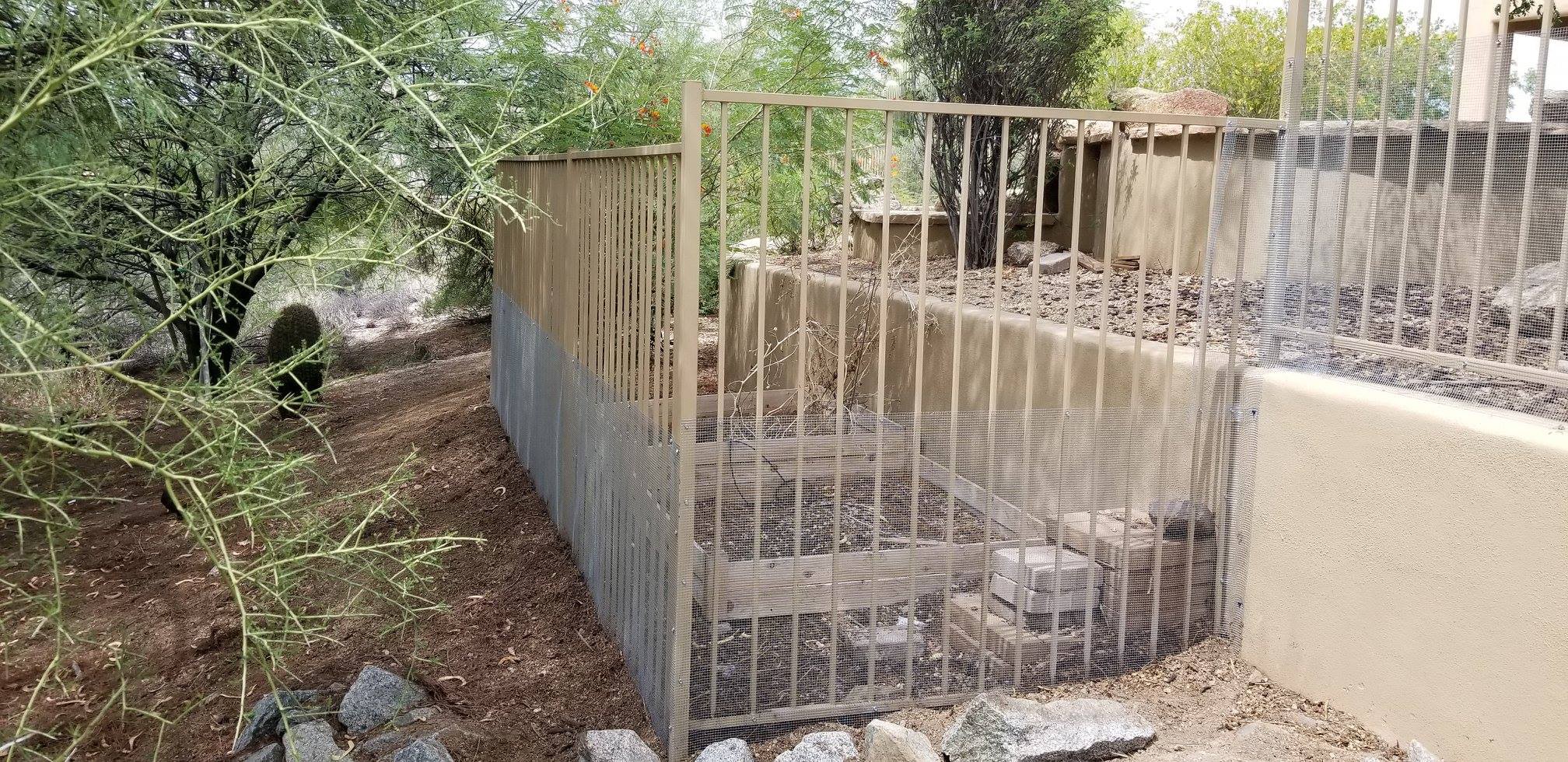 A rattlesnake fence installed onto viewfence, separating rattlesnake habitat from the protected area.
A rattlesnake fence installed onto viewfence, separating rattlesnake habitat from the protected area.
What works and does not work: rattlesnake proofing fact and fiction
Rattlesnakes hold a special place in Western culture, and as a result are at the center of a lot of contemporary mythology and urban legend. There are a lot of rumors and about what works to repel rattlesnakes, but few really hold any water. Here are the top misconceptions:
- If you think that chemical snake repellents work as a cheaper option: don?t bother. They don?t work at all, and rattlesnakes simply don?t care about them. In my experience removing thousands of rattlesnakes from homes in Arizona, there is absolutely no difference in snake activity at homes that pay for snake repellent and homes that don?t. Pest control companies that sell it know this, but sell it anyway because, as I?ve been told numerous times: ?customers ask for it?. It?s a scam; don?t fall for it. Currently, snake fencing combined with keeping a clean, rodent-free property is the most effective method to keep snakes out of a yard.
- Rattlesnakes do have some climbing ability, but they can?t climb up straight walls or metal. Rattlesnakes do sometimes hang out in trees or low branches of bushes, or climb through cracks in rocks ? but these rough and well-edged surfaces are a very different situation than the modern block wall or wire mesh. If rattlesnakes don?t have a ?foot?-hold, they simply cannot climb a smooth surface. There are always people who claim to have seen it first-hand, but these are either exaggerations or the misidentification of more capable climbers, like gophersnakes, coachwhips, and kingsnakes.
- Rattlesnakes can and do crawl over rope, horse-hair or otherwise. They don?t care.
- Rattlesnakes are not repelled by putting coffee grounds around the property.
- Mothballs fall into the same category as item #1 ? they just smell bad and rattlesnakes don?t care.
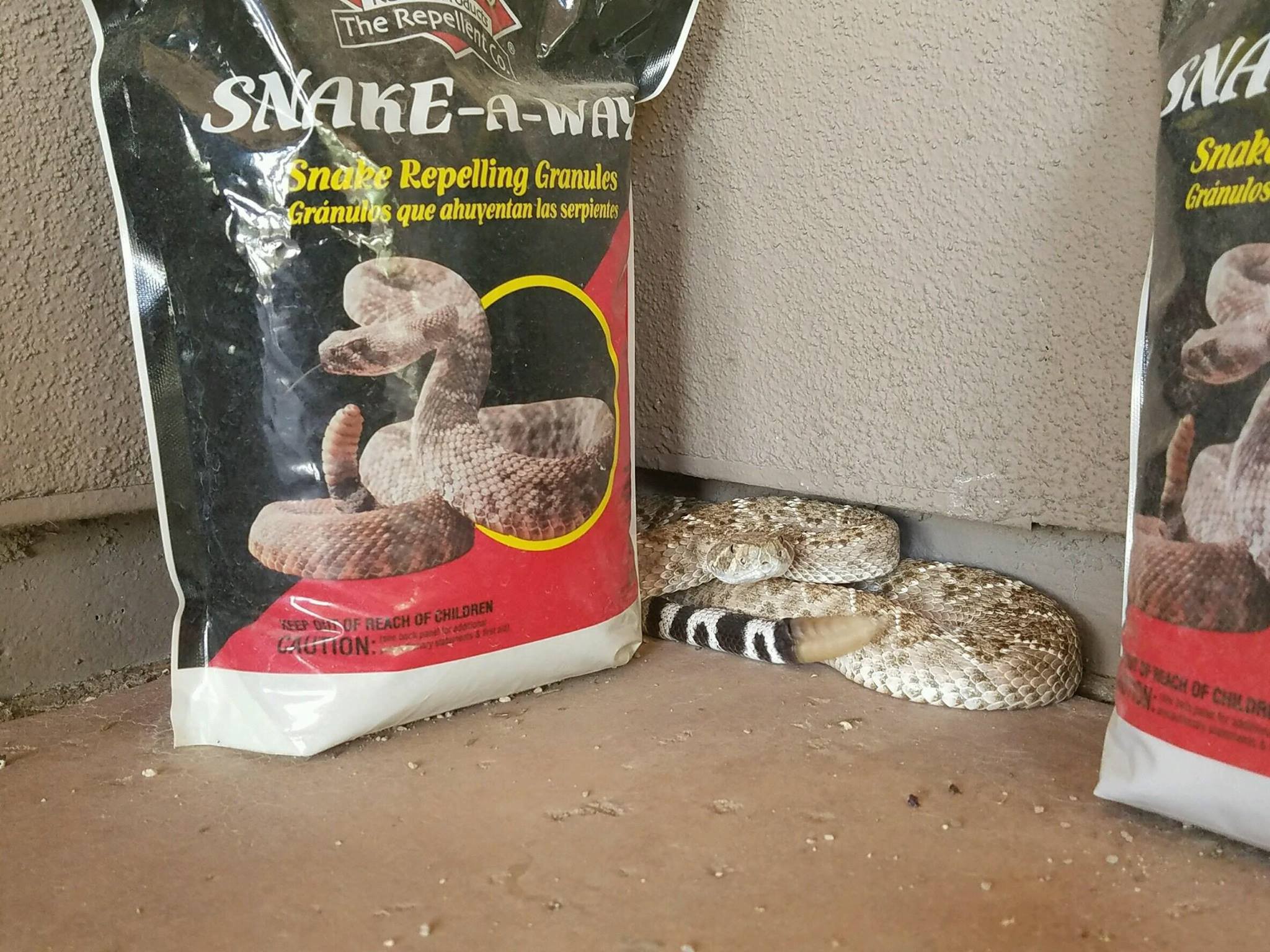 Don?t waste your money on chemicals ? rattlesnakes could not care less. This is an unposed photograph of a rattlesnake taking shelter under unopened bags of snake repellent within a yard heavily-treated with the chemical.
Don?t waste your money on chemicals ? rattlesnakes could not care less. This is an unposed photograph of a rattlesnake taking shelter under unopened bags of snake repellent within a yard heavily-treated with the chemical.
How to shop for snake prevention like a rattlesnake expert
The desert southwest is one of the most rapidly developing areas in the country. Most of those homes popping up as big blocks of outward expansion into previously-undisturbed native habitat. That means that more people than ever before are finding themselves face-to-face with animals they may have only seen on TV: rattlesnakes.
The new desert suburbs are home to the usual pests, like scorpions, cockroaches, and termites. However, pest control companies are not equipped to handle rattlesnake issues. Rattlesnakes are not ?pests? to be eliminated?regardless of how a person feels about rattlesnakes (or snakes in general). In almost every area they are found they are managed as wildlife, and need special consideration because of it.
Rattlesnake fence installation is a new and increasingly popular method of keeping rattlesnakes out of the yard. Unlike chemicals that don?t work (any of the snake-repellant stuff), rattlesnake fencing is a physical barrier attached to existing gates, fencing, and walls.
 This snake fence isn?t attached to anything and snakes can crawl right under it.
This snake fence isn?t attached to anything and snakes can crawl right under it.
General best practice for buying a snake fence:
We?ll get into detail later, but essentially, a rattlesnake fence must do a few things or it?s worthless. A few principles to consider that will help as a reference to the most important details on the list:
- Rattlesnake fences need to keep out rattlesnakes?period. Not some, not just baby rattlesnakes, not just large rattlesnakes, all rattlesnakes. Pass or fail.
- It is a better investment to spend more up front for an effective product rather than to have potential vulnerabilities for the sake of saving money in the short term. A fence that is 99% effective is not worth buying.
- Snake fencing and expertise with rattlesnakes go hand-in-hand. Ask questions until you feel comfortable, before and after the job is complete.
Rattlesnake fencing isn?t as simple as it seems.
That sounds simple enough, right? Just have the handyman, landscaper, or the pest control guy do it? It?s unfortunately not that simple. Unlike other kinds of fencing, snake fences must, above all else, provide the function of keeping rattlesnakes out. It should also look good, last a long time, and be installed with significant attention to detail.
Being a pretty new thing, it can be difficult for a homeowner to know what to look for when going through snake fence installation estimates. Obviously every company is going to tell you they?re the best at it, but how can you differentiate and cut through the noise? It?s not exactly like shopping for a new water heater where you can just compare features and pricing.
Depending on the size and layout of each property, rattlesnake fence services can range from relatively inexpensive single day projects, to a significant investment in finances and property modification. When considering options, the protection of your family, the aesthetic of the finished product, and the quality of workmanship are all of critical importance.
Before getting into the details, a notable anecdote about how snake fence installation is different than other home improvement projects you may take on:
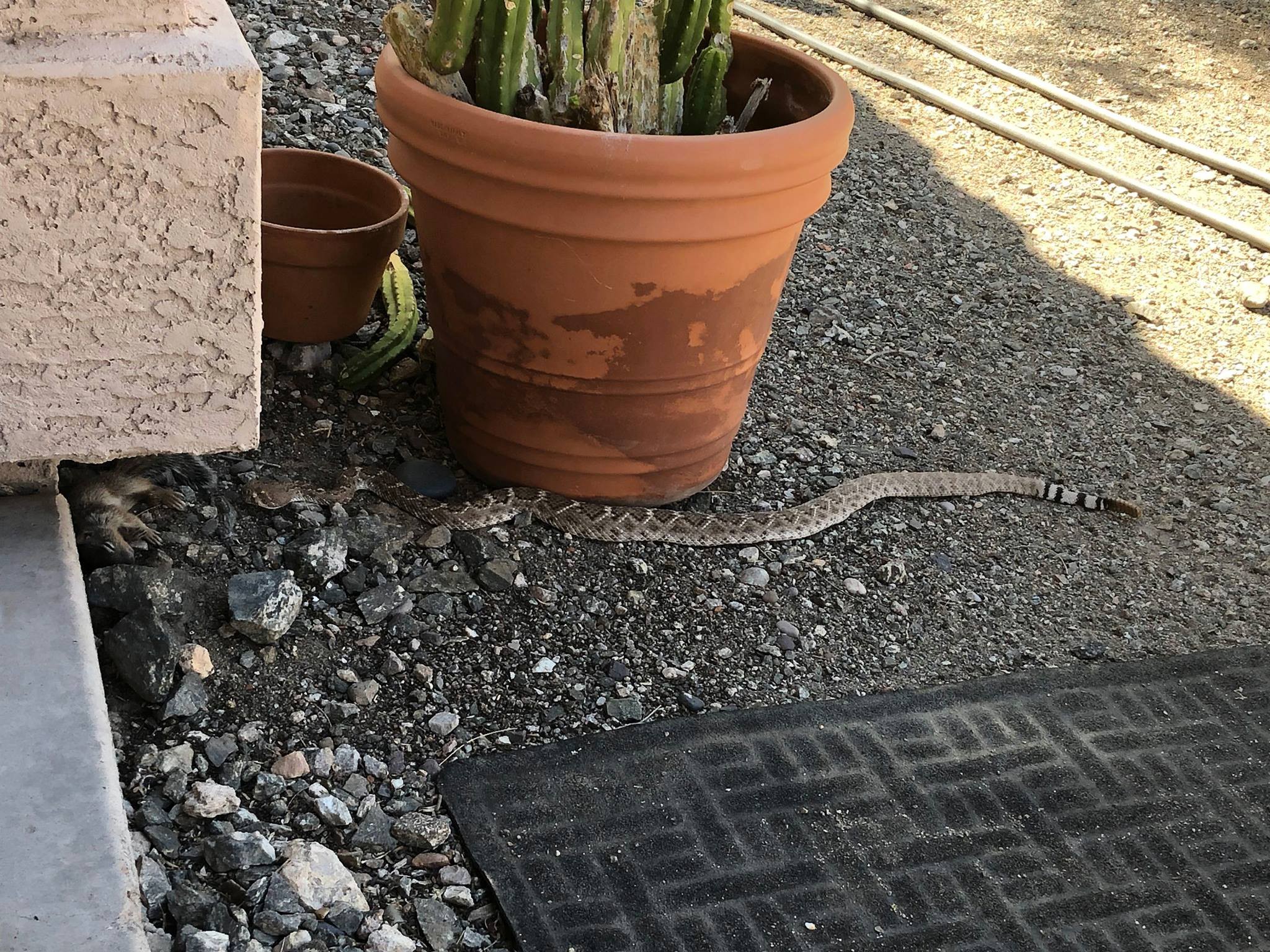 Understanding rattlesnakes in the wild is a necessary part of keeping them out of your yard.
Understanding rattlesnakes in the wild is a necessary part of keeping them out of your yard.
1. Does the company employ rattlesnake experts or on-staff biologists?
 Rattlesnake fencing experts working to educate the public on rattlesnake safety issues.
Rattlesnake fencing experts working to educate the public on rattlesnake safety issues.
Rattlesnake fencing works when it is designed and installed in such a way that prevents rattlesnakes from getting into an area. If a rattlesnake can climb over, squeeze, squish or slither past these barriers, there?s no sense in having it at all. In order to do this with any degree of accuracy, a deep knowledge and familiarity with how rattlesnakes live, behave, and move is an absolute necessity.
Would you buy a boat from someone who has never been on the water? How reliable would your surgeon be if their experience came from youtube videos? Without hands on experience observing rattlesnakes climbing and crawling, in addition to researching their wild behavior, a snake fence is just a guess, and not good enough for your family and pets.
Some snake fence companies even have free support services, like a snake identification line, or offer other rattlesnake-related services, like rattlesnake relocation, property inspections, and more. While these aren?t always directly connected to the snake fence installation itself, they can be indicators that the company knows what they?re talking about.
Does your snake fence company have someone on staff that can answer all of your questions, regardless of how obscure they are, about the snakes that live in your area? Ask them; test them. If you have an estimate from a rattlesnake fence provider and they aren?t staffed by rattlesnake experts, keep shopping.
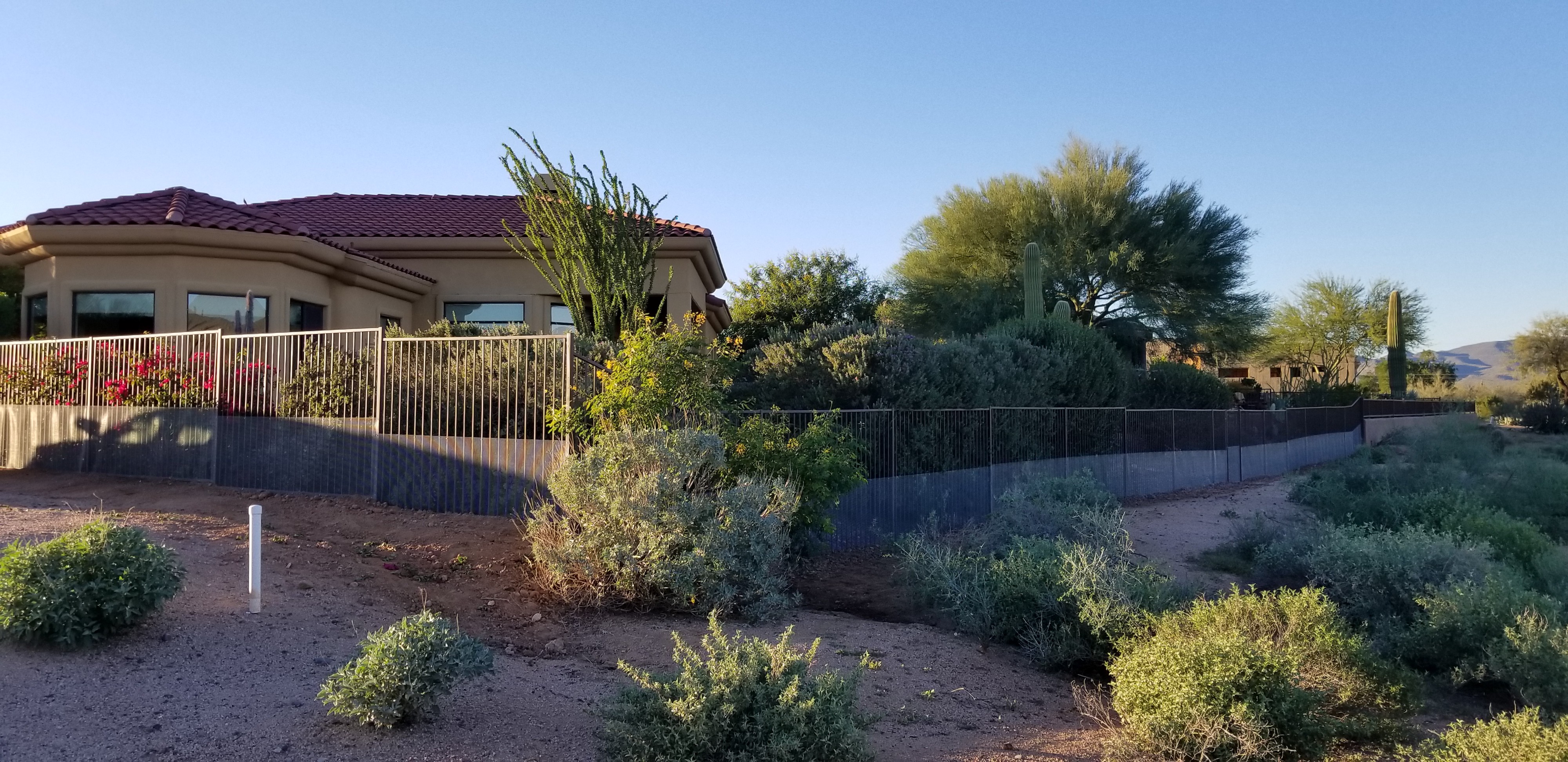 Snake fence applied to a view fence by a reputable rattlesnake fencing specialist.
Snake fence applied to a view fence by a reputable rattlesnake fencing specialist.
2. Do they specialize in snake fencing?
As it increases in popularity, some businesses that are primarily installers of regular fences, or pest control companies, have jumped into the snake fence game to add another service to the list of revenue sources. The problem is that if their methods are not being driven by rattlesnake expertise and specific knowledge of these animals physical capabilities, you?re getting their best guess. It is unlikely that the standards, even if the workmanship is good, is as effective as you need it to be.
If at all possible, go with a company that specializes in rattlesnakes, and stay away from pest control companies or handymen. According to rattlesnake relocators and people tasked with catching rattlesnakes in yards, rattlesnake fencing installed by the local handyman, pest control company, or landscaper are generally the least effective at living up to what they claim to do. In many cases, they can even become rattlesnake traps that serve to funnel rattlesnakes into a property rather than exclude them.
While it?s possible that a pest control company may be able to do a partially decent snake fencing job, it?s just not what they do and there are generally significant errors in their methods or materials. Also, I?d be surprised if anyone actually has experience working with rattlesnakes. Stick to experts and specialists: you?ll get what you pay for. If your snake fence estimate isn?t from a company that specializes exclusively in rattlesnakes, keep shopping.
A rattlesnake trying and failing to get around a properly-installed rattlesnake fence, based on rattlesnake behavior and biology.
3. Do they have installation standards based on actual rattlesnake biology?
A baby rattlesnake is as small as a half inch wide, so how good is a rattlesnake fence that has any opening that would let one in? The development of specific standards, best practice, and prevention methods are very important to determine how effective a rattlesnake fence actually is.
Rattlesnake fencing isn?t meant to keep out most rattlesnakes, it should keep out all rattlesnakes, from the tiniest to largest ever found. That means that there are some pretty specific measurements that will get the job done.
Here are some great videos showing how these standards can make a big difference in the end:
In our research, we found that, to do this, these are the most optimal specifications to keep rattlesnakes out of a yard:
- No gap greater than ?, from ground-level, up to at least 30? from the lowest ledge or climbable surface.
- If your fence is built on dirt ? it is 100% necessary for the mesh not only to be buried, but also angled away from the fence line in order to prevent rodents from digging and water run off.
- If your fence is built on block wall ? 1/4? or less gap the block wall and the fence, from end to end.
- It must be a minimum of 30? above any flat surface, otherwise a large rattlesnake may be able to climb over it.
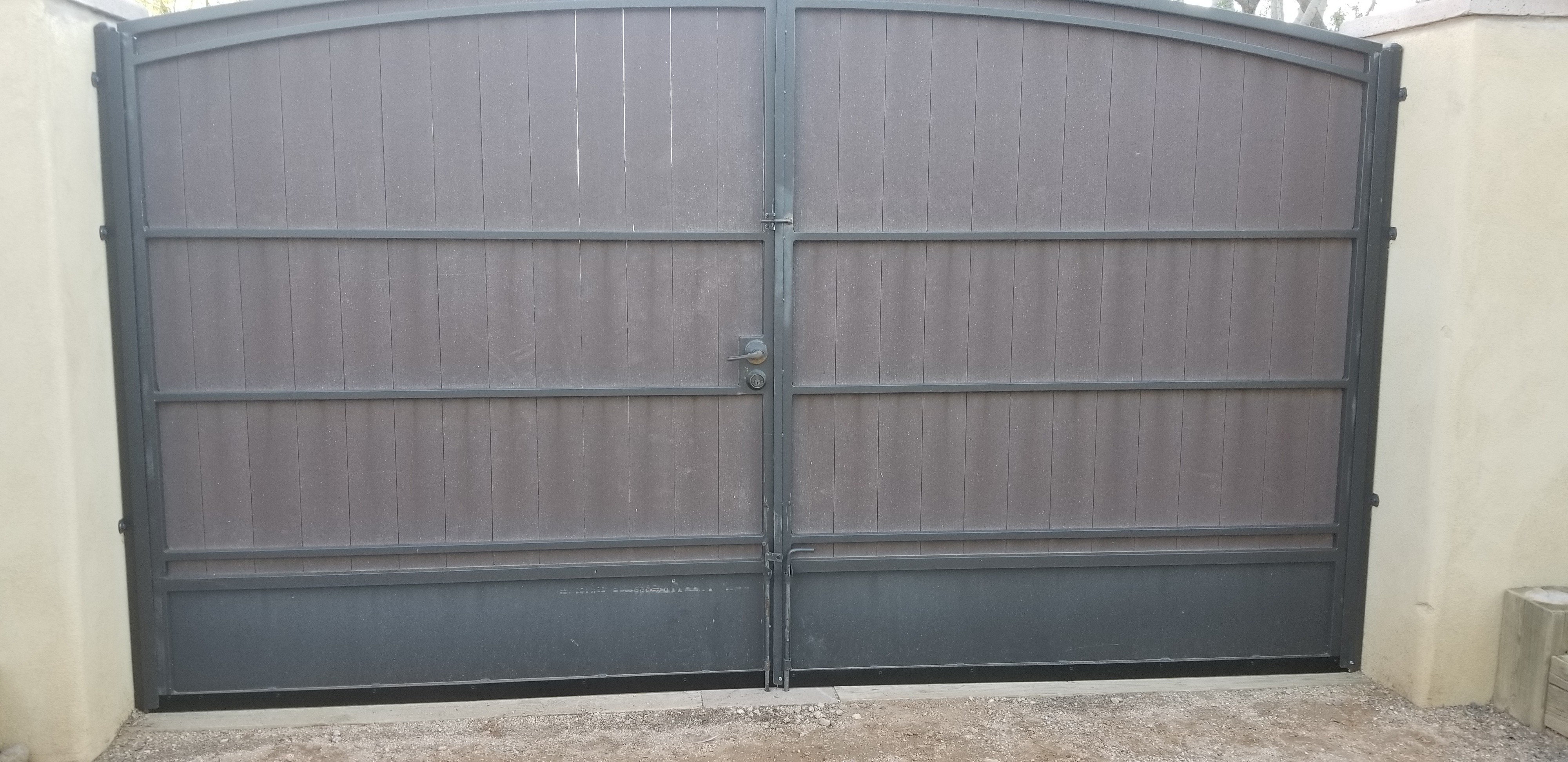 RV gate that has been modified to exclude rattlesnakes.
RV gate that has been modified to exclude rattlesnakes.
4. Do they have good solutions for gates and courtyard areas?
According to rattlesnake removal records, it is a fairly common scenario to find rattlesnakes in backyards that already have some sort of substandard snake fencing installed and believe themselves to be protected. However, these inadequate snake fence jobs were put in place by installers who unfortunately have failed to effectively secure the entire perimeter and provide a dangerous false sense of security.
In almost all cases, this is due to the gates not being secured properly or at all. This may not always be the fault of the installer, as there may be home owners that falsely believe that rattlesnakes wouldn?t come through the front gate. However, again referring back to rattlesnake removal records, rattlesnakes often follow walls and actually end up coming in through side gates and courtyards. In scenarios where the property is almost secured but not completely, the installers have effectively created a rattlesnake trap. Rattlesnakes that would otherwise just crawl through the yard and leave can become stuck here, resulting in an actually higher chance of unwanted encounter than if no snake fence had been installed at all.
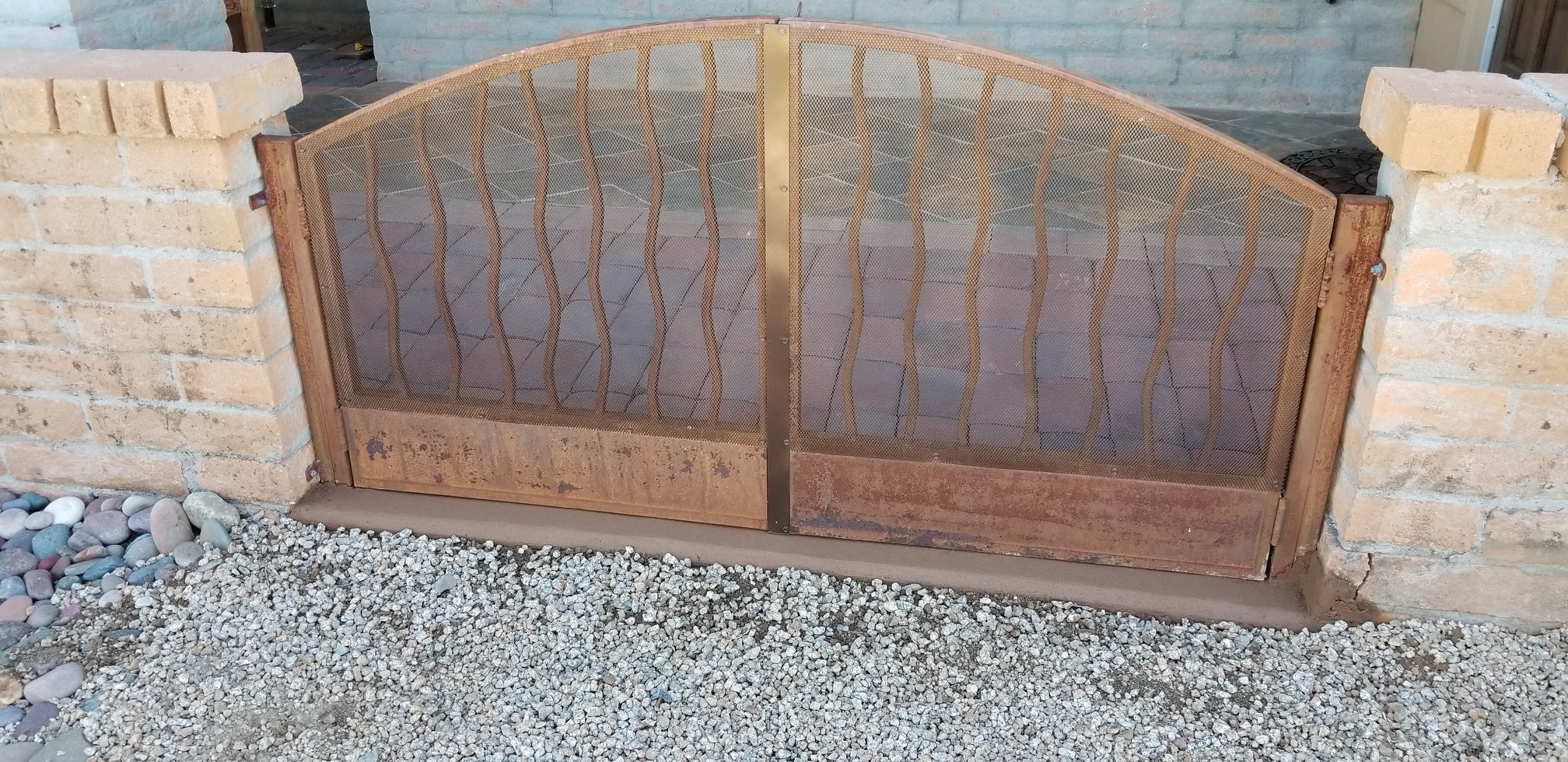 Decorative courtyard gate modified to exclude rattlesnakes using special mesh to look good with the existing metal.
Decorative courtyard gate modified to exclude rattlesnakes using special mesh to look good with the existing metal.
Another common scenario is an attempt to secure the gates, but its not fully effective. Gates are meant to move, so some materials are better for that than others. Here are standards, materials, and things to look for in the gate portion of your estimate:
- Do their utilize two solid surfaces for barriers or mesh at the bottom and sides? Do not use mesh or anything that can bend. Steel mesh used to secure gaps on the sides or bottom of moving gates will inevitably bend over time, creating a potential access point for a snake. The gardner or homeowner may bend it, the dog or kid may run into it, the trash can hits it, the list goes on. The provider must use solid surfaces to secure the gaps in gates such as fiberglass, metal, aluminum, etc.
- Will they build permanent barrier such as concrete curb on a gate built on gravel or dirt? Again, mesh is not sufficient against dirt/gravel that can be dug out or washed away in heavy rain. The entire gate must close to the same standard size as the rest of the gate: a maximum of ?. If this is not specified, that may be a problem.
- Do they use ? mesh to secure gaps on gates with large openings, such as those that are common as a part of many back yard fences. ** this applies only to the back or body of the gate? not the sides. **
- Will your gate open and close without obstruction? In most cases, it is possible to ad materials that will ensure the gate opens and closes without rubbing, catching, etc. Rattlesnake prevention should not interfere with the function of the gate in any way.
A company that offers rattlesnake fence installation should be more than aware of this, based not only their expertise of rattlesnakes and their behavior, but accounts from their customers after being prompted to inspect the property. Of all things that a rattlesnake fence must do, it must secure the yard from entry by rattlesnakes, and leaving the gates undone (or poorly secured) is an absolute failure of that objective. A reputable and responsible snake fence company will understand this and reject any projects where this absolute perimeter cannot be completely secured, including at the request of the homeowner. If your snake fencing estimate includes an option to not secure gates and drain blocks, keep shopping.
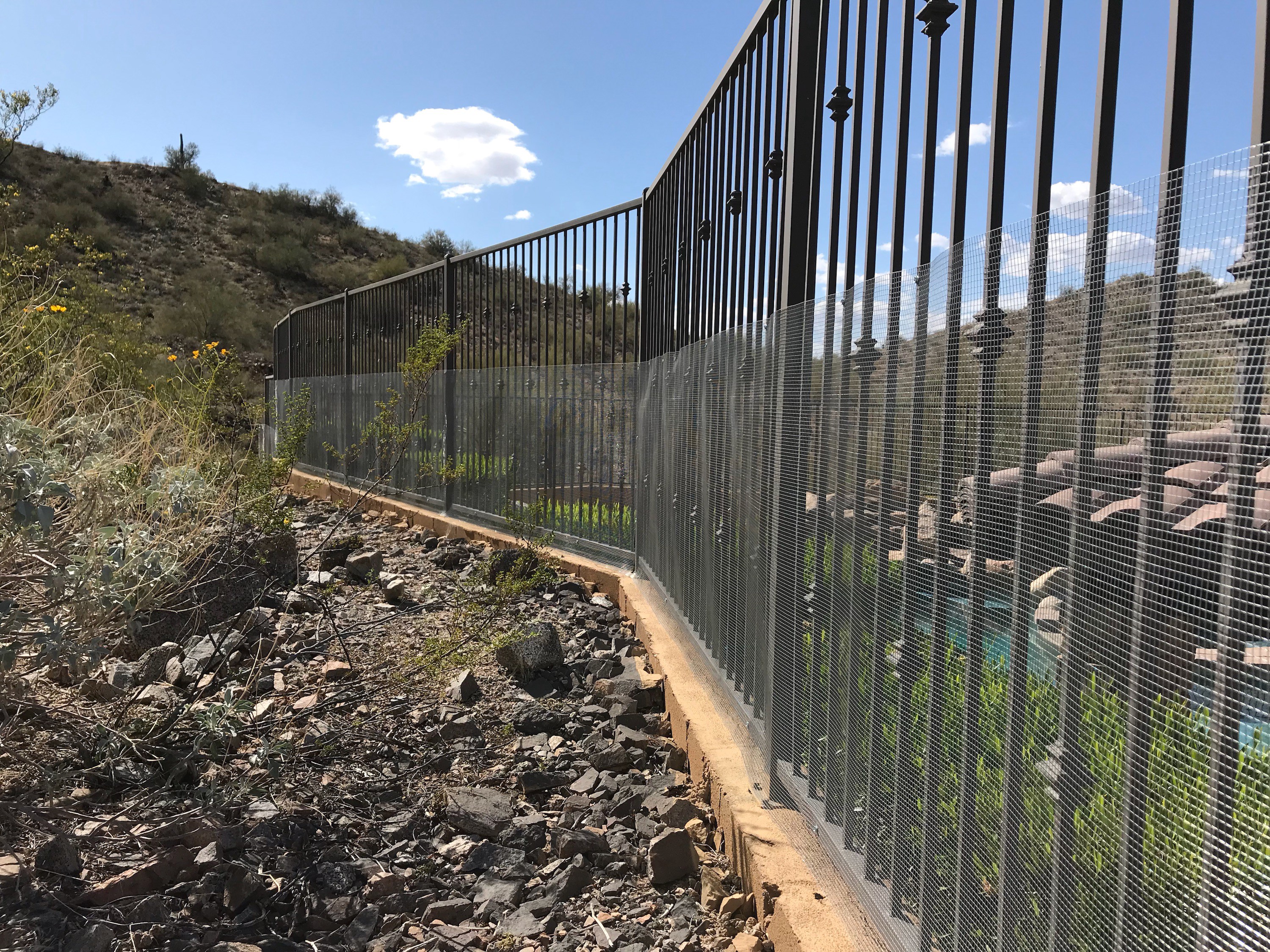 Snake fence attached to a fence using screws instead of materials that degrade in the sun.
Snake fence attached to a fence using screws instead of materials that degrade in the sun.
5. Do they use screws to secure the steel mesh?
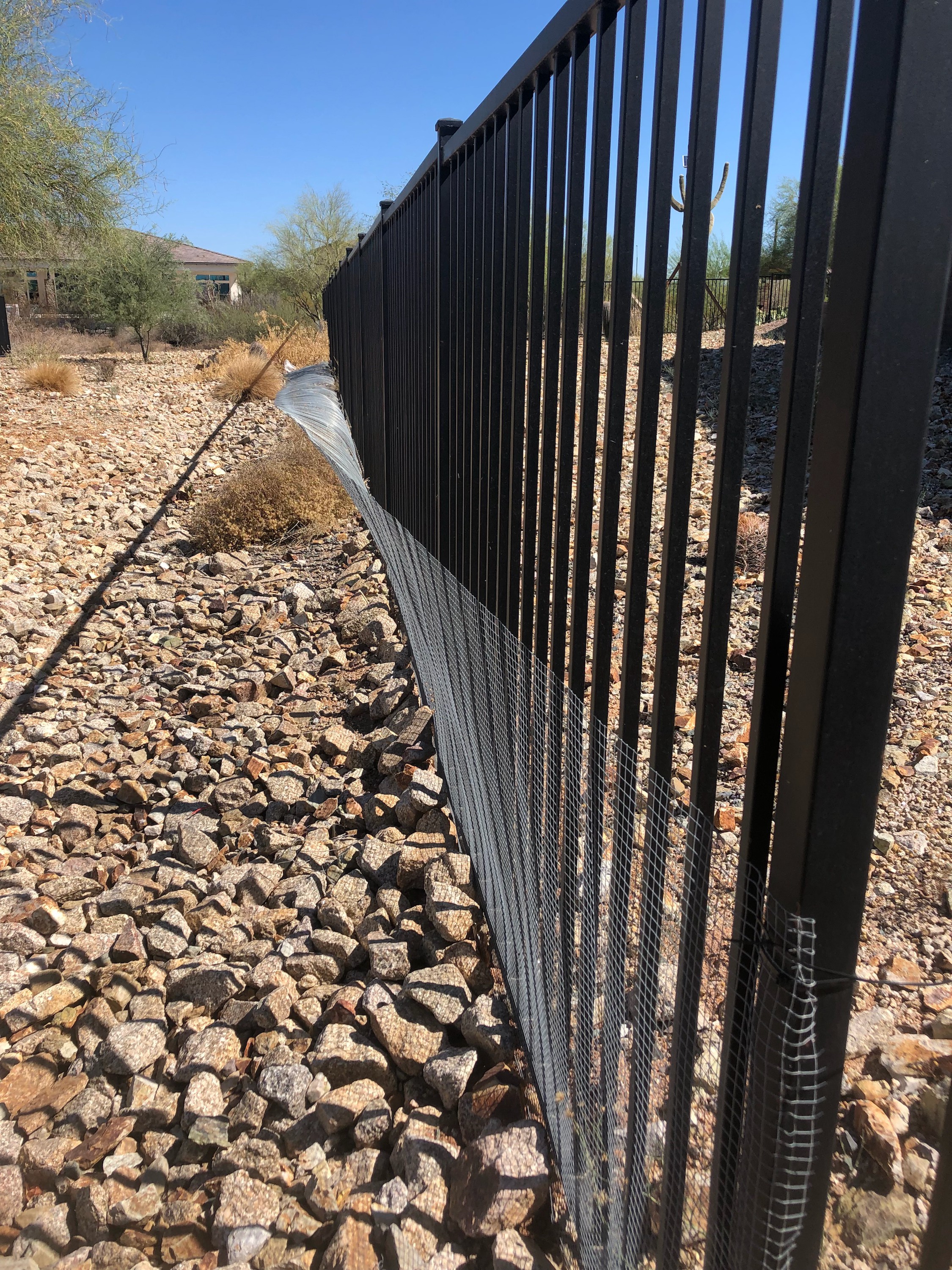 Snake fencing peeling away from view fence after the zip-ties have degraded in the sun and snapped.
Snake fencing peeling away from view fence after the zip-ties have degraded in the sun and snapped.
Summer in Arizona can be brutal, and unless you want to replace parts of what may be a costly snake fence project after just a few years, you need materials that will last.
As a rattlesnake remover, one of the most common situations where I see snake fence fail is when it is connected to the fence using thin wire ties, or even worse, plastic zip ties. Not only are these not as attractive and exact as the screws in the end, using anything but screws can cause some problems:
- Plastic zip ties can snap in as few as a few months in the Arizona sun, leaving gaps in the fence and creating a snake trap out of your yard.
- Plastic zip ties slip down fencing over time, warping the mesh and creating gaps, wavy-mesh, and other problems.
- Wire ties can quickly rust and degrade, and eventually break, causing gaps and unattractive waves in the mesh.
- Wire ties can damage the fence, accelerating rust and corroding iron bars.
There may be some instances where using wire ties is justified, like on a surface that?s just too thin to attach screws to, or if the fence is built of solid steel or rebar, but that?s about it. The snake fence installers should be able to answer your questions about this, though don?t be fooled into thinking plastic is going to hold up to the desert sun for long.
The materials that make up the rattlesnake fence are only as good as the way it is fastened to the existing fence. This is one of the details that causes the most failures, so it?s nothing to overlook. If your estimate uses plastic zip-ties or wire ties instead of screws, keep shopping.
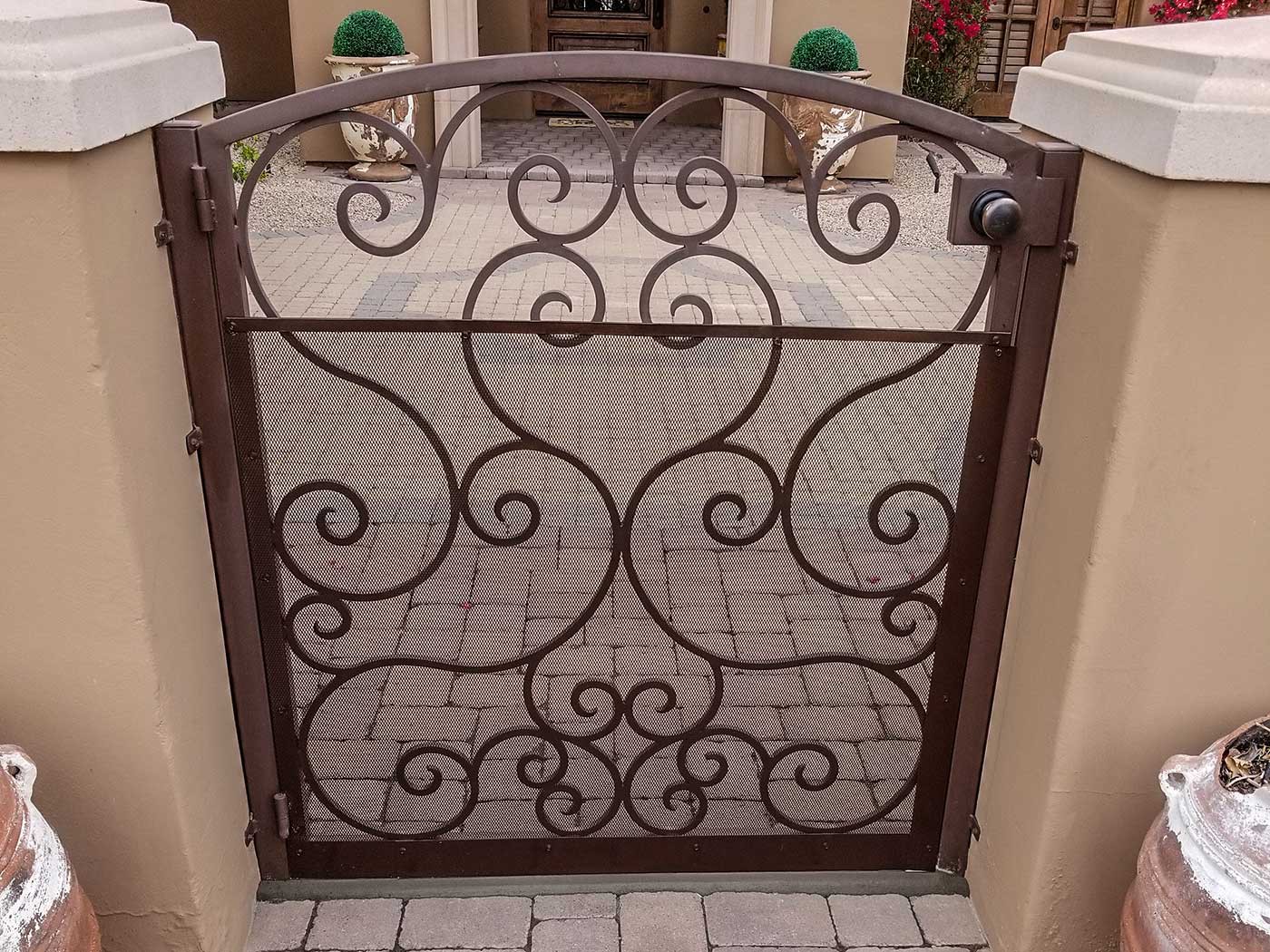 Decorative courtyard gate properly modified to exclude rattlesnakes.
Decorative courtyard gate properly modified to exclude rattlesnakes.
6. Do they care about how it looks?
Snake fencing is essentially a lot of new metal attached to existing metal, which can look pretty awful if how it all looks isn?t carefully considered during the process. When done properly, mesh, screws, plates and concrete blend in with the existing fencing to look like it was always a part of the property. When snake fencing is installed without considering the aesthetics, it can look like braces put in by a blind dentist ? metal hanging in rough, uneven edges, wire hanging and bent along the bottom of gates, and generally detracts from how the yard should look.
It is apparent in my visits to properties to remove rattlesnakes that some companies really take great care to make their product look great, or at least as invisible as it can ? and some don?t think of it at all, with very little in between. How do you know which will care and which won?t, or even worse, just don?t have good aesthetic taste?
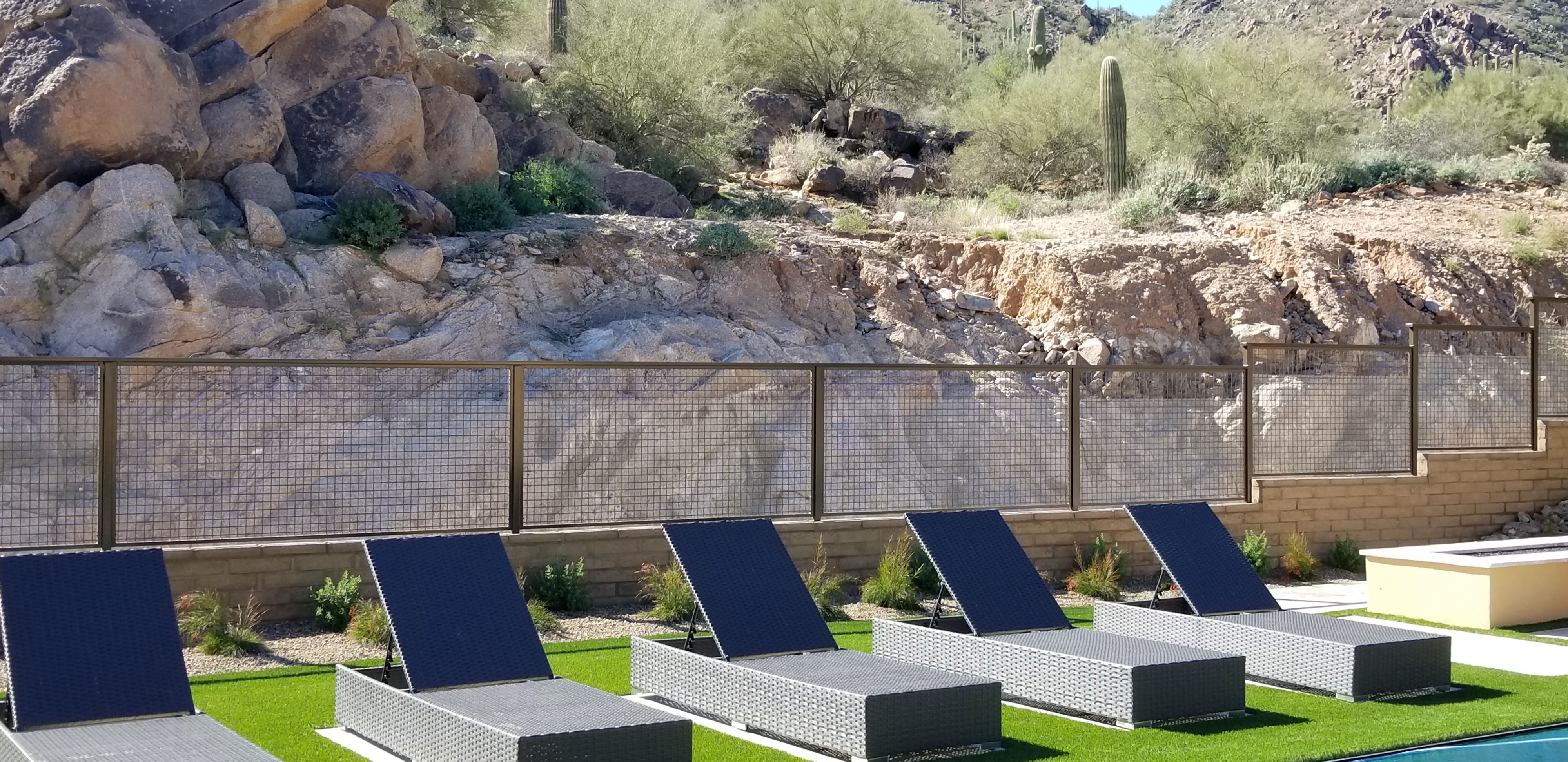 Rattlesnake fence installed to work with existing aesthetics of the property.
Rattlesnake fence installed to work with existing aesthetics of the property.
An easy way to tell the difference is to look at the company marketing materials. Do they mention how things look? Does the company proudly show photographs of completed projects? You should get a quick sense of whether or not the company cares about the looks of your property that way.
Here are a few things that you should ask:
- ?Do you consider the overall aesthetic of your work and its placement in my yard??
- ?Will you blend the color of steel to match the color of my gate??
- ?My courtyard gate is expensive and beautiful, how will you keep it looking good??
- ?Do you offer any upgraded or different styles of mesh for courtyard gates??
- ?Can you show me examples of everything you just said??
Courtyards, in particular, should receive special attention. Not only are front entryways one of the most common areas where rattlesnakes are found at homes, but it?s the first impression as guests arrive at your home. Enclosed courtyard gates are often very carefully selected to match the decor of the home and how you wish to greet the world, and any snake fencing attached to it needs to look good. Again, from my experience capturing thousands of rattlesnakes at homes, the work done to courtyard gates is perhaps the most revealing that some companies care about this, and some simply cannot offer options sufficient to maintaining a high level of aesthetic appeal.
Another easy way to get a good sense of the general artistic taste of a snake fence company is to just look at their marketing materials and website. How do they look? Is your general sense that this company cares about how things look, and more importantly, will care about how the finished product looks? If you don?t get a good sense of the aesthetic taste and care from the brand, keep shopping.
 A kingsnake (harmless) captured by a representative from a snake fencing company becomes a learning opportunity for the neighborhood kids.
A kingsnake (harmless) captured by a representative from a snake fencing company becomes a learning opportunity for the neighborhood kids.
7. What kind of customer service do they offer?
If you?re buying a snake fence, it?s likely you?re spending hundreds to a few thousand dollars to get the job done right. You can expect to have some great customer service for your money, which all ties back to their expertise (or not) with rattlesnakes.
Things you should expect from a snake fence installation company:
- Quality workmanship that meets your standards
- Good communication ? is your call returned promptly? Do you get appointment confirmations?
- Do you feel confident that you would be able to get ahold of people if you need attention?
- Do they have 24 hour support to remove a rattlesnake if something happens?
- Do they offer any type of rattlesnake removal or snake information?
- Are they qualified to perform a full inspection of the property before completing a project to make sure no rattlesnakes are trapped inside?
- Do they work with HOA regulations to make sure your snake fence is in compliance?
That last couple may be rare out there, but rattlesnake removal records indicate that it could be a big deal. Even with the best snake fencing available, sometimes gates are left open, rodents create unseen holes, or the landscaper bent some mesh ? the unpredictable can happen. If a snake does show up on the property, how does the company plan to fix it? Some Arizona snake fence companies offer 24 hour snake removal services at a free or reduced rate to fencing customers. Others may also offer support services, like free identification of snakes, an information line, or general educational support. These are things you may never need, but if an unidentified snake appears at 2am, it?s something you?ll be glad to have available.
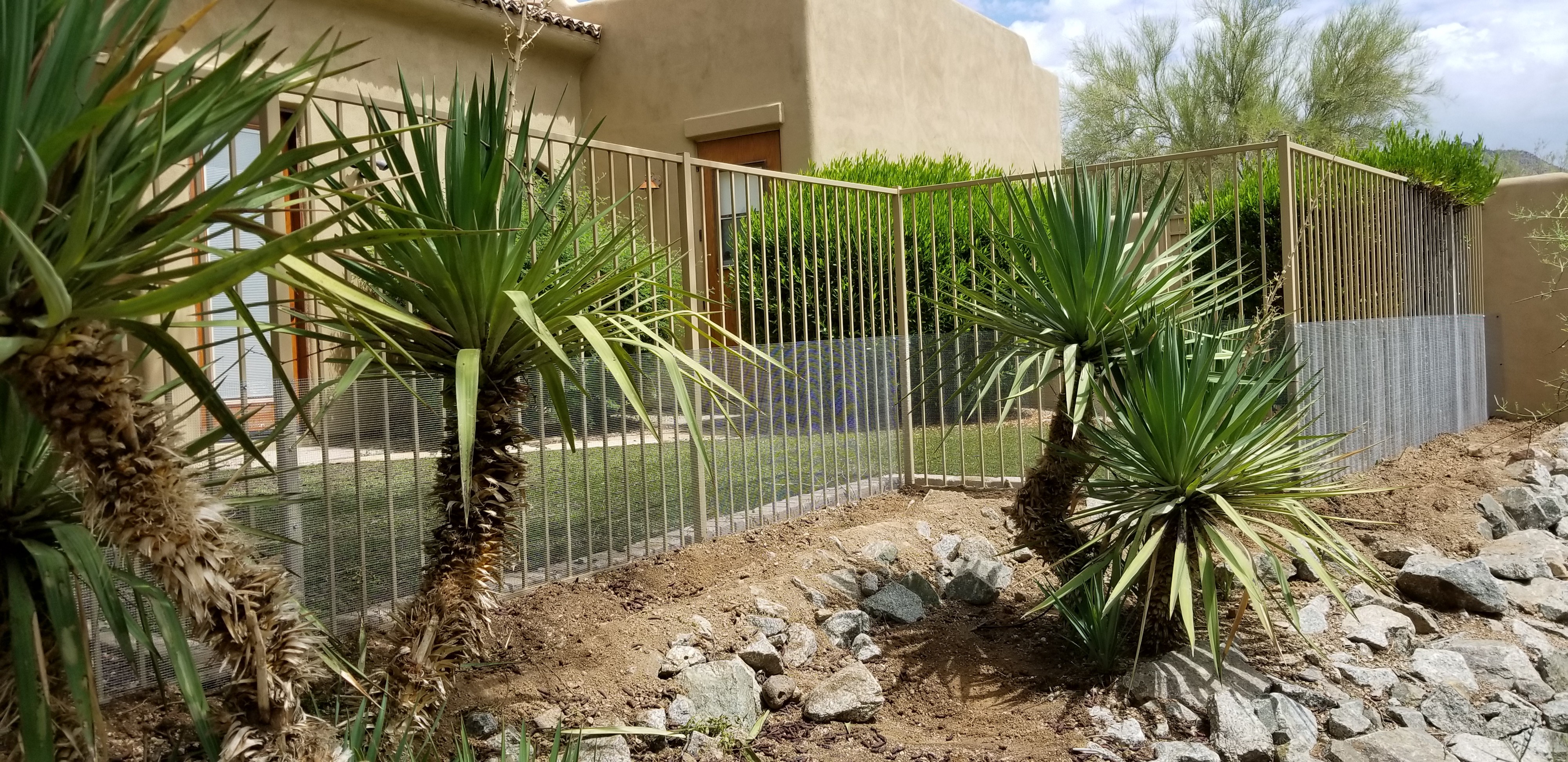 Materials for snake fence projects don?t usually justify charging an up-front deposit.
Materials for snake fence projects don?t usually justify charging an up-front deposit.
8. Do they make you pay a deposit?
While it is normal for many types of home improvement to charge an up-front deposit, this is most often because of the cost of materials. For example, a $10,000 job to replace the tile in your home can?t start without the tile, which will cost several thousand dollars and it is reasonable to pay some costs up front to cover that cost. Rattlesnake fencing is a different situation, with materials that are generally already owned by the company installing it, or otherwise not as extensive as other types of property improvement.
Keep in mind that with rattlesnake fence installation, the materials are usually not exceptionally expensive when purchased in bulk, so the up-front costs are more reasonable. You may be charged a deposit, but it?s not necessary and most of the best snake fence installation companies don?t charge until the job has been completed and you are completely satisfied with the finished product. There may be some exceptions, where special materials are necessary to order or time and distance requires travel costs to be incurred, but the snake fence installer should go over those items with you before the estimate is finalized.
Be wary of snake fence companies that charge large deposits up-front without a clear explanation of why it?s needed. If you?re working with an unlicensed handyman or someone just doing snake fence installation on the side, you?re at risk of losing that investment, or being stuck paying for something that you don?t like. If you?re being asked to pay a large deposit before the job starts, be wary and keep shopping.
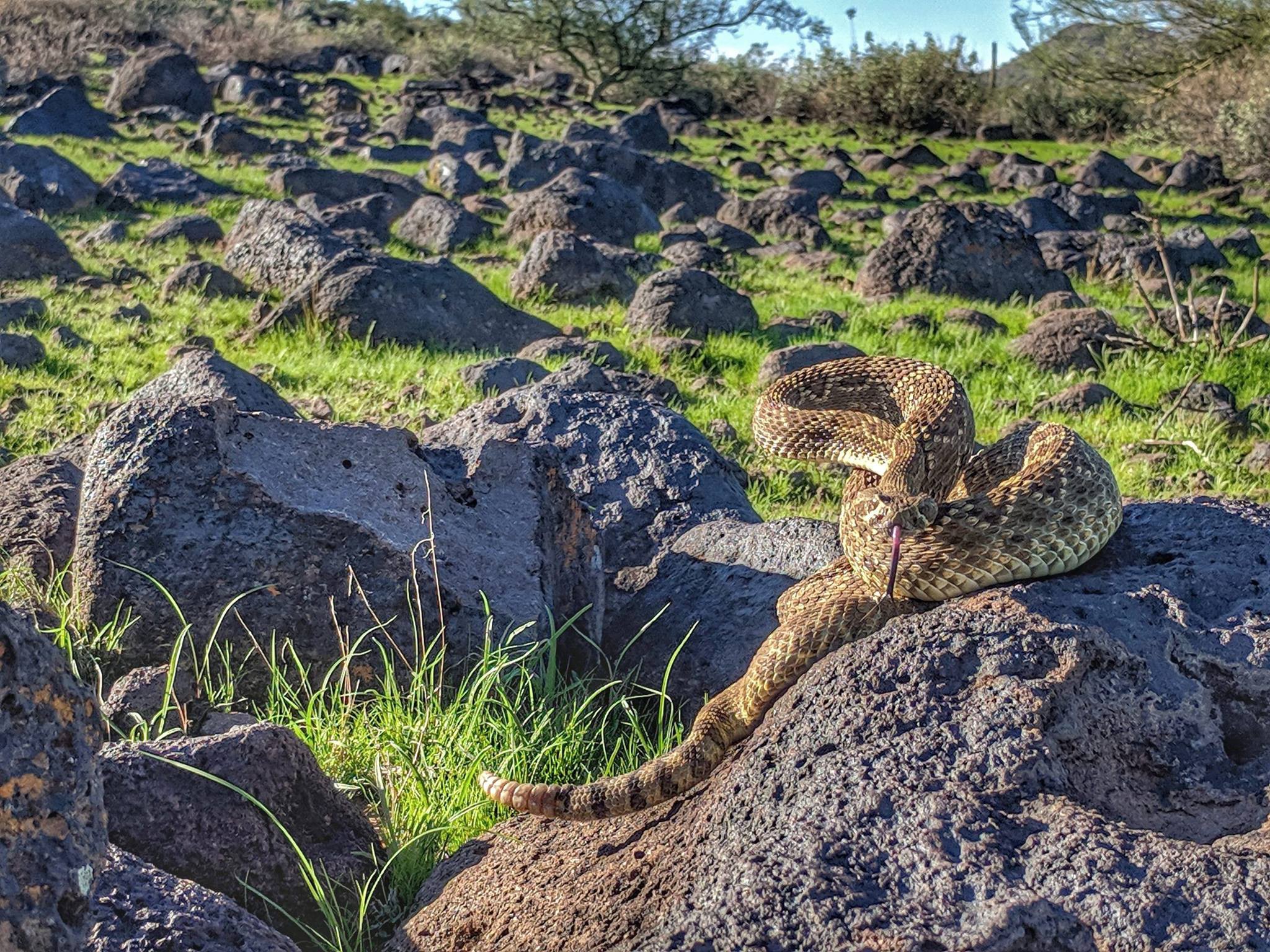 Rattlesnake captured at a home in Phoenix and properly relocated to suitable microhabitat by a trained and licensed professional herpetologist.
Rattlesnake captured at a home in Phoenix and properly relocated to suitable microhabitat by a trained and licensed professional herpetologist.
9. What are their qualifications?
Snake fence companies are not just contractors; you are hiring them to install very specific materials to do a specific job: keep rattlesnakes out. As stated earlier, that requires not only some pretty specialized expertise, but the licenses to do it legally and ethically.
Most states require some license or permit to be able to legally handle wildlife, including rattlesnakes. To capture and move them from the property, either during the snake fence installation or later as part of a service call, you?ll want to work with a company that can do so legally and knowledgeable enough to not just ?move? your problem to the neighbors? yards. In Arizona, for example, anyone who will relocate a rattlesnake needs to have a Wildlife Services Permit issued by the Arizona Game and Fish Department.
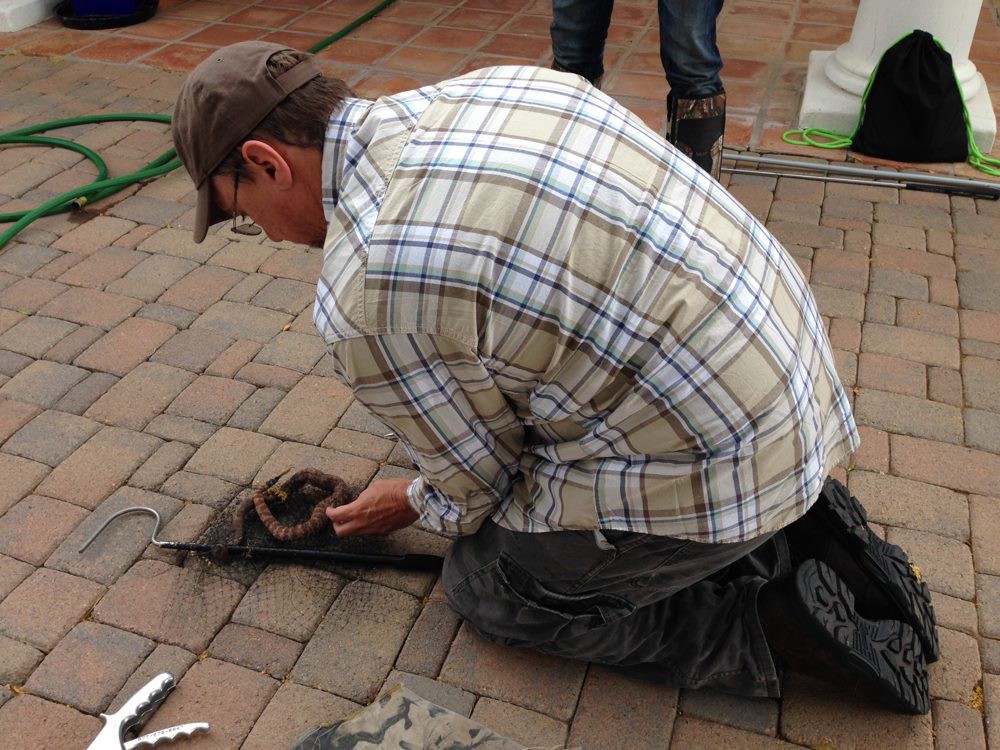 Working with rattlesnakes safely is difficult and dangerous work best left to professionals, like this rattlesnake relocator carefully cutting a speckled rattlesnake from bird netting in a Phoenix backyard.
Working with rattlesnakes safely is difficult and dangerous work best left to professionals, like this rattlesnake relocator carefully cutting a speckled rattlesnake from bird netting in a Phoenix backyard.
Moving a rattlesnake from one place to another safely in a way that doesn?t create more problems than it solves is delicate work that these permits provide guidelines for. This is not just for the safety of the animal, but your own property ? and the person doing the work. If you hire a handyman and he decides to play Crocodile Hunter when he sees a rattlesnake, and is bitten on your property, are you liable? Rattlesnakes attract all kinds of people, often adventure-seekers and people who generally may not be great to be in your yard tasked with the possible capture of a venomous snake. The best way to be protected in this case is to make sure that the company you hire is trained and carries the proper licenses to do the job. If your snake fence company isn?t experienced, qualified, and licensed to handle venomous snakes safely and ethically, keep shopping.
10. Are they licensed, bonded, and insured?
Even though rattlesnake fencing is installed on existing structures, things could still go wrong if the snake fence installer isn?t as experienced as they may claim to be. You?ll want to protect yourself and your property by making sure that you?re covered for any potential damage caused to your property in the process, and that the person doing the installation has a clean record.
If you don?t see a contractor license number, you can ask the company about their status or contact your state?s Registrar of Contractors to make sure they?re covered and in good standing. If your snake fence company isn?t qualified and licensed to do the work, keep shopping.
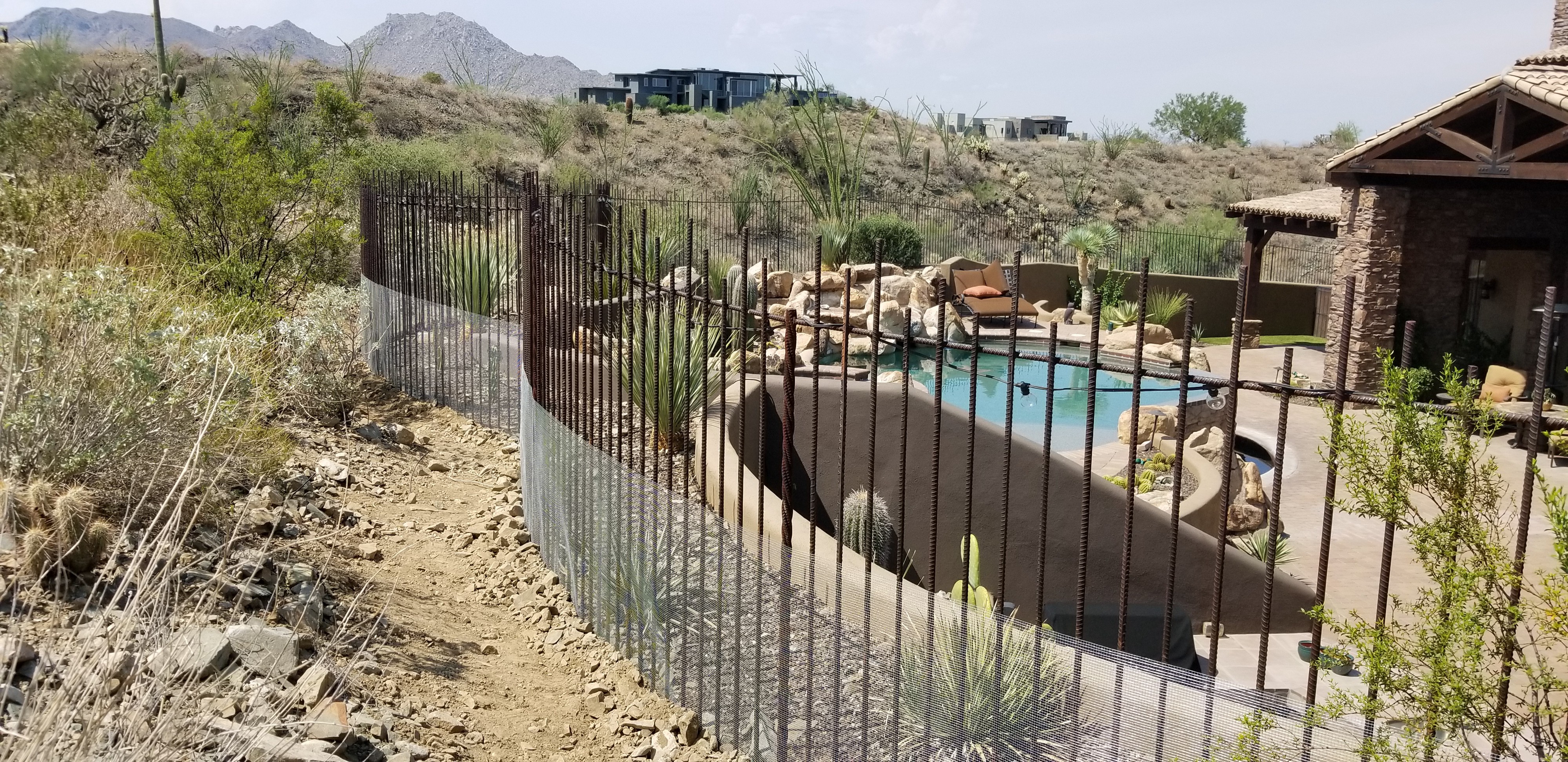 Working with a licensed and bonded professional can help protect you from damage to your property.
Working with a licensed and bonded professional can help protect you from damage to your property.
Ultimately, a rattlesnake fence must be more than peace of mind?it needs to work.
More than anything, the safety of your family and pets is the primary concern for any homeowner looking to install a snake fence. This must also be the focus of the company you choose to install it ? if you?re not getting the job done correctly and to the highest standard possible, it may not be worth doing at all. Unfortunately this is one investment that has no room for error.
My experience as a rattlesnake relocator and dispatcher for the busiest rattlesnake removal hotline in the country has given me a lot to think about when it comes to keeping snakes away from a home. To sum it up: you get what you pay for. While there are a lot of lower-cost options out there that claim to keep snakes away, they?re generally not worth it. Would you buy a less expensive car with a seatbelt that might work some of the time, or would you spend a little more and get one that?s been thoroughly tested? If you?re worried about rattlesnakes in the yard, there?s no match for reliable snake fencing as an investment.
Beyond any measurement or standard, a deep understanding of the capabilities and behavior of the animal itself should be upmost on your list of expectations from a snake fence provider. What can a rattlesnake do? What will a rattlesnake do? Everything I?ve listed above is one aspect of a broad solution that all add up to the most effective barrier possible. Combined with keeping your yard clean and rodent-free, a great rattlesnake fence is one of the wisest decisions a homeowner can make to protect their investment, aesthetic, pets, family and friends.
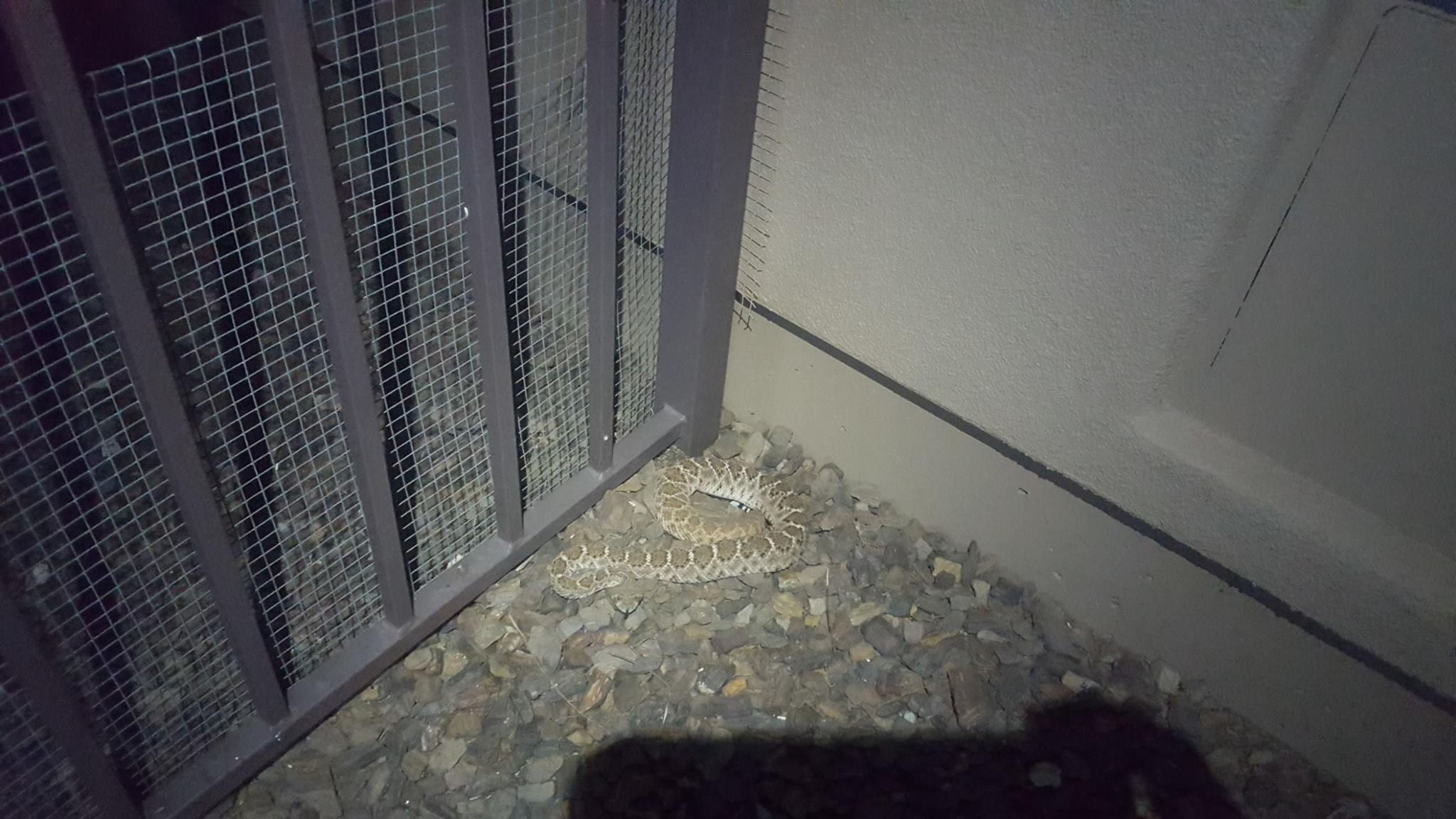 Rattlesnake in a backyard with improperly installed snake fencing. Know what to look for to avoid this situation.
Rattlesnake in a backyard with improperly installed snake fencing. Know what to look for to avoid this situation.
